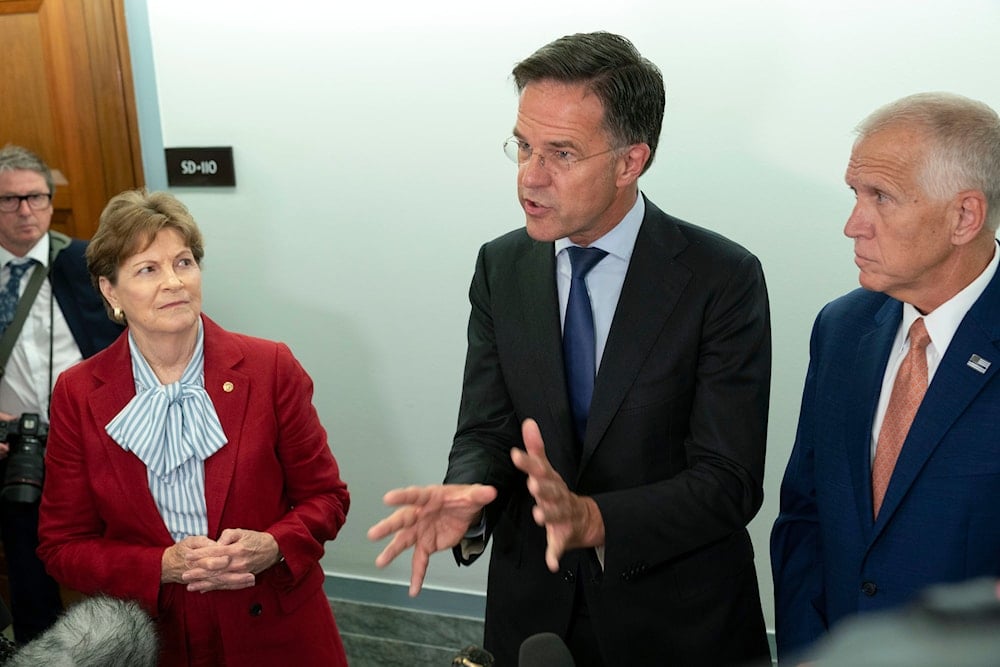Rutte: Secondary tariffs on Russia would impact China, India, Brazil
The US signals it will punish Russia’s key trade partners, China, India, and Brazil, with sweeping secondary sanctions unless they help pressure Moscow into a deal.
-

NATO Secretary General Mark Rutte accompanied by Sen. Jeanne Shaheen, D-NH, left and Sen. Thom Tillis, R-NC, right, speaks during a news conference on Capitol Hill in Washington, Tuesday, July 15, 2025. (AP)
NATO Secretary General Mark Rutte warned that secondary US "tariffs" on Russia would have a severe economic impact on China, India, and Brazil, pushing the three countries to pressure Moscow toward a peace deal.
Speaking to reporters during a visit to the US Congress, Rutte said the proposed US measures could “slam back” on Russia’s major trade partners if President Vladimir Putin refuses to engage in what he described as meaningful negotiations.
“If you live now in Beijing, or in Delhi, or you are the president of Brazil, you might want to take a look into this, because this might hit you very hard,” Rutte stated.
He referenced comments made by US President Donald Trump, who said he would impose 100% secondary tariffs, interpreted as sanctions, on nations continuing to trade with Russia if no agreement is reached within 50 days. “Please make that phone call to Putin,” Rutte urged those nations.
Trump’s 100% secondary tariffs plan
On Monday, Trump announced his intention to impose 100% secondary tariffs on countries continuing to purchase Russian exports if no ceasefire deal is reached in the coming weeks. Standing beside Rutte at the White House, he said, “We’re going to impose a 100% tariff… It’s time to see real movement, otherwise the consequences will be immediate and painful.”
US Commerce Secretary Howard Lutnick later clarified that "secondary tariffs" referred effectively to secondary sanctions, targeting third-party countries or companies that maintain economic relations with Russia. Both mechanisms, he said, remain part of Trump’s policy arsenal.
The proposed measures follow a wider transatlantic defense initiative announced at the meeting, under which the US will supply Ukraine with weapons, while European allies, including Germany, the Netherlands, and Canada, fund the delivery.
Lavrov demands explanation
Russian Foreign Minister Sergey Lavrov expressed skepticism about the feasibility and motivation behind Trump’s 50-day deadline. Lavrov pointed to increasing NATO and EU pressure on Washington and criticized Brussels’ push for additional sanctions. He warned that European economies are bearing the brunt of the sanctions war, while asserting that Russia will endure.
“Our trade partners hear what has been said, but they can hardly predict their actions now. They have international obligations… I do not see how they can abandon their independent policy,” Lavrov added.
Russia’s top trade partners include China, India, Brazil, Turkey, and South Korea, with trade volumes reaching hundreds of billions of dollars annually. These countries rely heavily on Russian energy, fertilizers, metals, and defense goods.
Secondary US sanctions would force them to choose between doing business with Washington or maintaining ties with Moscow. Such sanctions could destabilize global supply chains, inflate energy prices, and trigger political rifts within blocs like BRICS and the Global South.

 3 Min Read
3 Min Read










